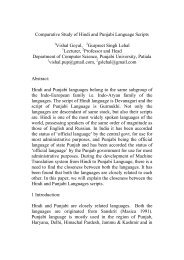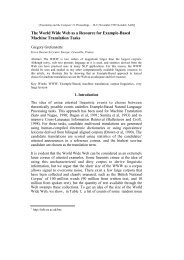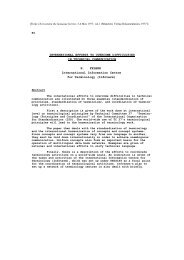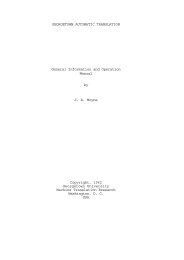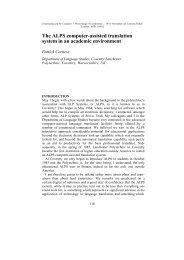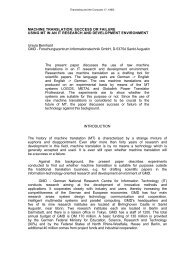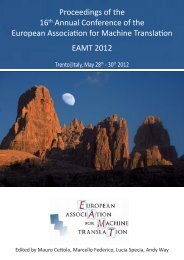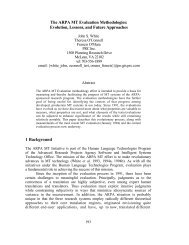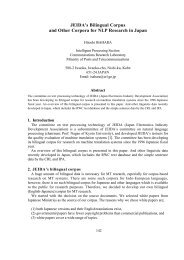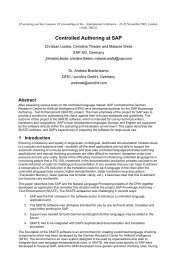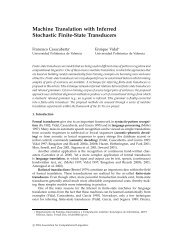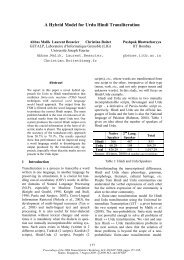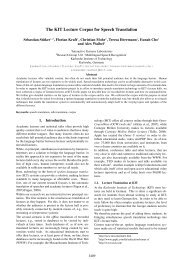pidgin translation - Machine Translation Archive
pidgin translation - Machine Translation Archive
pidgin translation - Machine Translation Archive
Create successful ePaper yourself
Turn your PDF publications into a flip-book with our unique Google optimized e-Paper software.
74 META<br />
However, it is always difficult for a post-editor to understand a rough<br />
<strong>translation</strong> which does not convey all the content of the original. Interpretive<br />
help may be provided by background knowledge of the subject matter or by<br />
sheer professional experience as a translator, but there is the constant danger<br />
of misinterpreting. For this reason, we consider that a satisfactory rough <strong>translation</strong><br />
intended for post-editing must conserve all of the semantic and grammatical<br />
information contained in the original. We pursue this ideal below in the proposals<br />
for « specific <strong>pidgin</strong> » (see also Hofmann, 1968b).<br />
As for the current output from CT systems, Masterman's complaint that<br />
its « characteristics per se are never investigated » is as apt today as when she<br />
first made it ten years ago (Masterman, 1967 4 ). True, there have been<br />
investigations in which « consumer opinion » was tested; but the test material<br />
was a product with the arbitrary merits and defects that resulted from an<br />
existing system. So far as we know, the problem has never been looked at the<br />
other way round, which is to test readers with deliberately designed « simplified »<br />
<strong>translation</strong>s before designing the system that would produce them.<br />
Sponsors of future CT projects would be well advised to avoid the « hit or<br />
miss » approach typical of most CT projects to date by attending first to the goals:<br />
what is minimally acceptable, and how much tolerance readers show for various<br />
ways in which CT output may deviate from a man-made <strong>translation</strong> par excellence.<br />
With these goals duly specified, CT could become an engineering problem to which<br />
the criterion of the cost-quality relationship could be effectively applied. We shall<br />
claim below that human readers can tolerate considerable lack of quality provided<br />
certain conditions are fulfilled 5 .<br />
II<br />
Mark Twain said in a speech to the Vienna Press Club :<br />
I am indeed the truest friend of the German Language — not not only now,<br />
but from long since — yes, before 20 years already... I would only some<br />
changes effect. I would only the language method — the luxurious, elaborate<br />
construction compress, the eternal parenthesis suppress, do away with,<br />
annihilate; the introduction of more than thirteen subjects in one sentence<br />
forbid; the verb so far to the front pull that one it without a telescope<br />
discover can. With one word, my gentlemen, I would your beloved language<br />
simplify so that, my gentlemen, when you her for prayer need, One her<br />
yonder-up understands.<br />
...I might gladly the separable verb also a little bit reform. I might none<br />
let do what Schiller did; he has the whole history of the 30 Years' War<br />
between the two members of a separable verb in-pushed. That has even<br />
4. Most of Masterman's article was actually written in 1960 : see her footnote, p. 197.<br />
5. Numerous writers have criticized man's natural tendency to try and make computers<br />
simulate man. One could cite Arthur C. Clarke, Wayne Danielson, and the Sedelows.<br />
Meanwhile the few remaining sponsors of CT still hope that the computer will produce<br />
<strong>translation</strong>s in the same sort of language as we are used to. « To require computer-generated<br />
language to conform in detail to all, or most, of a human's linguistic conventions is ana-<br />
logous to requiring early printers to make their output resemble manuscript writing.<br />
Initially, just such « magic realism » may be demanded, to demonstrate the machine's true<br />
virtuosity and intelligence as well as to fully achieve communication. Later we may<br />
learn to accept as satisfactory very different output language from the computer. »<br />
(Sedelow, 1967, p. 210).<br />
Vol. 15 - No 2<br />
Juin 1970



